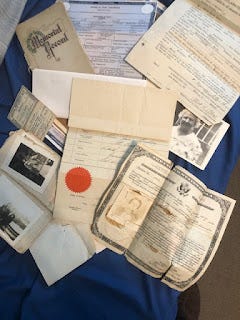(This Father’s Day I retell the first of four parts in a series of essays about a discovery I made last summer.)
Squirreled away in one of my boxes of old files I found a portfolio of papers left behind by my father. It must have fallen into my hands in the days following his death from a stroke in 1999.
There’s a small notebook that he took with him when he joined the Army Air Corps in October 1942. He reported to Fort Custer in Michigan, the shipped out to Keesler Field in Mississippi, on to the Tech School Squadron in Chicago, and ultimately to the Aviation Cadet Center in San Antonio before going overseas.
He never saw action in the war. He did see the aftermath of war, however, in France and Germany, and as a stenographer at the war crimes tribunal at Nuremberg.
In the inside cover of his journal, he documented his promotions from PVT to PFC to CPL to SGT, etc. On the very first page is a faded B&W photo of his Mom, then one of my big sister Nancy (10 years older than me), then the first of many shots of our mother — mainly of her taking golf swings — plus his own three sisters, a 1930s car, one of his his brothers, two of his brothers-in-law, and some Army buddies and their wives and a few of him fishing.
He loved to fish.
He must have thumbed through this many, many times while away from home.
Although he told me stories about his life, I never was fully able in imagine what it had been like for him, born in 1916, growing up on a small farm in Canada, the youngest of six kids, losing his father at the age of ten, then leaving the farm with his mother to live in town (London, Ontario) for a short while, before on to Detroit as “nickel immigrants.”
Five cents was the cost of crossing the river on the ferry in the 1920s, and therefore pretty much the cost of citizenship in the USA — for those of the right European descent.
Because he was the youngest, it turned out that my father outlived all of hIs siblings, surviving just longer than his sister Norma, who passed away a year before him. Accordingly, he ended up with many of his siblings’ official documents — birth certificates, an application for citizenship in the U.S., a social security card, wedding certificates, photos, and finally, their death certificates.
Two of his sisters died with no other surviving relatives, so he became the sole custodian of their life chronicles.
What am I do with this stuff?
As far as I can tell, none of my Dad’s siblings left any writings behind to document their lives — no journals or letters, just a few faded photographs and those yellowed documents.
My Dad was another matter, however. Inside a manilla folder marked “Manuscript” he left a combination of handwritten and typed pages, apparently a short story or novel that he started to write. There are notes, an outline, and a certain amount of narrative.
If memory serves, this may be the story about a man’s escape into the north woods, where he survives on his skills as a fisherman.
Early in his story, there is this: “The world is divided into two kinds of people, those who must fish and those who can’t understand.” I haven’t read very far into the manuscript yet, but I believe a woman shows up with a great golf swing.
While the manuscript may never qualify as the Great American Novel, it will definitely be of interest to us, his descendants. And I’ll say this about my father — he would have made a hell of a contestant on that television series “Alone.”
(TO BE CONTINUED)
LINKS:
ISIS-linked rebel group attacks Ugandan school, killing dozens (CNN)
Putin says Russia positions nuclear bombs in Belarus as warning to West (Reuters)
Ukraine Runs Into Russian Air Superiority (WSJ)
Trump’s indictment plus candidacy could endanger democracy and the rule of law (WP)
Dictatorship? How Hitler, Stalin and Trump show it’s easier than you think (Guardian)
Special counsel asks judge to keep Trump from disclosing evidence in classified documents case (ABC)
Barbara Kingsolver: ‘Rural people are so angry they want to blow up the system’ (Guardian)
Southern Baptists’ Fight Over Female Leaders Shows Power of Insurgent Right (NYT)
Biden to kick off first reelection campaign rally after rolling out major union endorsements (ABC)
Lawmakers’ lack of AI expertise leaves opening for corporate interests eager to influence policy (WP)
Flawed chatbot or threat to society? Both? We explore the risks and benefits of AI (NPR)
The Age of Chat — The new A.I. systems pretend to converse with us. But who’s writing the script? (New Yorker)
Another AI threat: The next pandemic (Axios)
The new AI-powered Photoshop is easy and a little terrifying (WP)
AI drive-thrus may be good for business. But not for the rest of us (CNN)
How the Unabomber’s unique linguistic fingerprints led to his capture (The Conversation)
These Pandemic-Era Habits Just Won’t Die (WSJ)
How Indigenous kids survived 40 days in Colombia's jungle after a plane crash (NPR)
Iranian Province Imposes New Job Restrictions On Afghan Migrants (RFE)
Fatherhood is messy and fraught. Rembrandt and other artists knew that well. (WP)
Miami Police Searching for Defendant with Seventy-one Felony Counts Who Skipped Out on Restaurant Check (New Yorker)

No comments:
Post a Comment